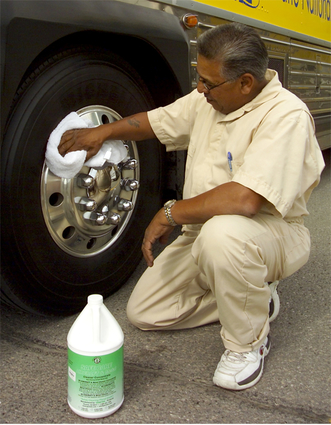Buy green when it comes to products and services
 (Download Image)
A Lab program encourages the purchase of "green" products.
(Download Image)
A Lab program encourages the purchase of "green" products.
The Environmental Protection Department’s Pollution Prevention (P2) Team and the Supply Chain Management Department (SCMD) recently hosted a series of Department of Energy workshops on the subject of environmentally preferable purchasing (EPP). EPP involves the buying of products or services that have a lesser or reduced negative impact on human health and the environment when compared with competing products or services serving the same purpose.
Implementation of an EPP program is required for all DOE sites.
Also termed "green purchasing," EPP seeks to conserve resources, save money and meet federal regulations. EPP emphasizes the purchasing of:
- Alternative fuels and vehicles
- Energy- and water-efficient products
- Environmentally preferable and biobased products
- Non-ozone depleting substances
- Recycled content products
- Paper containing a minimum of 30 percent post-consumer fiber
EPP also focuses on minimizing the purchase of toxic/hazardous chemicals, as well as generally reducing purchases by determining whether a product or service is really needed, or can perhaps be acquired for free through a materials exchange.
EPP workshop attendees included LLNL Technical Release Representatives (TRRs), SCMD management, contract administrators and purchase requesters from organizations within the Facilities and Infrastructure Directorate. Representatives from Sandia National Laboratories, Livermore also attended. Topics covered included the drivers behind EPP, resources and tools for implementing EPP, program requirements and examples of effective programs and practices.
"The workshops reached a number of key personnel involved in making purchasing decisions at the Laboratory," said Bruce Campbell of the Pollution Prevention Team. "However, all employees — especially those who routinely request the purchase of materials or products through TRRs — stand to benefit from learning how they can help the EPP program become a successful way to protect the environment and a better business practice for the Laboratory."
For more information on EPP, contact elliott4 [at] llnl.gov ( John Elliott, ) EPP Representative for SCMD, at ext. 2-6646. The Pollution Prevention Team can be reached via p2help [at] llnl.gov ( e-mail ) or on the Earth Hotline by dialing EARTH (3-2784).




